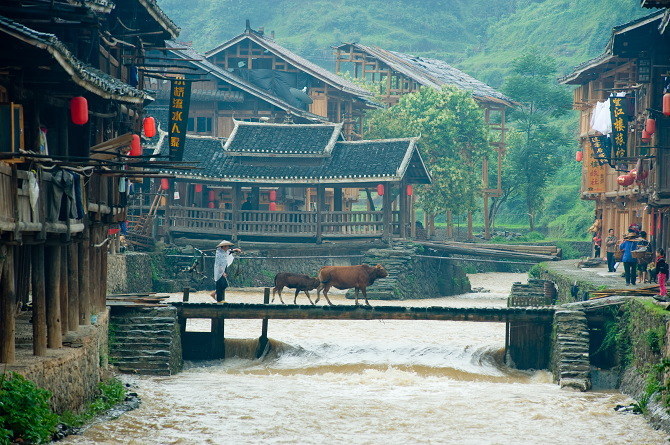
Despite the fact that China orchestrated one of the largest economic booms ever on record, the unbearable rural poverty is running wild and blighting many remote regions of this vast nation. Economic disparity is not an uncommon occurrence for large, industrialised nations (such as US and Russia) with certain regions lagging behind others in terms of wealth and prosperity, and China makes no exception either. Authorities have stated that resettlement is the only possible way to overcome the rural poverty problem which seems to be persistent if not on the rise. Providing people in the rough, mountainous regions of Guizhou with basic amenities and infrastructure such as roads, drinking water, fuel for winter etc. is only a temporary solution as the region itself is very inhospitable and barely provides the conditions for sustaining life.
The gap between rich city China and poor rural China is growing by the day and becoming a real problem. In the last decade or so, China's double digit economic growth has propelled certain cities and strata of society to unimaginable wealth and prosperity whilst others have been left behind. At the start of the economic boom, enticed by the prospects of better life, many rural Chinese moved to the city and began sending back remittances to poorer family members back in the countryside. These remittances seemed to improve the situation somewhat but were unable to provide sustainable improvement. Although the government poured billions into rural infrastructure during the remittance boom period, the gap between China's rich and poor is ever growing. A study by the Chinese Academy of Social Sciences has shown that the gap between poor and rich in China has been growing at an alarming rate since the mid nineteen eighties, and now stands at the colossal sixty eight percent. In twenty thirteen, it was estimated that rural dwellers had an average annual (disposable) income of merely six hundred and seventy GBP, whereas city dwellers in China had an annual disposable income of nearly two thousand two hundred GBP.

The need to relocate poor people living in Guizhou to better regions is more than apparent. Statistics show that more than eleven million residents are living under the poverty line, with around two million people considered living in 'chronic, extreme poverty'. One shouldn't be fooled by the city scene on display in Guizhou, the white-gloved chauffeur ushering a tender lady of wealth and her shopping bags into a black Rolls-Royce is a far cry from the actual economic reality of the province's rural areas – where the situation is dramatically different.
The people living in these regions are well aware that their shabby surroundings a world away from the glitzy skylines and Shanghai and Beijing, and for most of them the relocation couldn't happen soon enough. Many of the villages in impoverished areas of provinces such as Guizhou don't even have tap water, let alone basic infrastructure like roads. Schools (as few as there are) in worst affected areas don't even have blackboards – teachers are forced to scribble daily lessons right onto the wooden wall of the shabby school buildings. The Longtan district is one of the most impoverished in the region, even though most of the local residents are strongly attached to their land and roots (they are from the Miao ethnicity) they agree to undergo the relocation in order to escape extreme poverty. A lady from Longtan said that life wasn't as bad as before – price of grain had risen, and her family was able to afford a TV – a rather strange addition to a wooden shack, a somewhat grotesque picture showing the brutal economic realities of living in China's poop rural areas. Longtan region was connected with the surrounding world by road only recently. Many people in similar situation are looking to the city for a solution to their problems, they want to experience a different life – one which at least provides them with basic amenities usually taken by others for granted.
Groups of people from Longtan and other areas of the province have already relocated to some of the cities nearby, one such city (and county) is Songtao, where many families have occupied freshly built urban apartments fitted with all the comforts one would expect of city living. One problem though is employment for people who have relocated to the city – many of them are farmers, used to working the land for a living, but there is no land to work in the city. The relocated families are happy with their comfortable new life but employment and sustainable living are issues which must be addressed by the government as soon as possible.

Not all migrations are human and not all of them are caused by poverty, animals in the wild which are in danger of becoming extinct are also relocated in order to provide them with better living and more chance of survival, away from poachers and habitat destruction, which is the case with the biggest rhino airlift relocation


